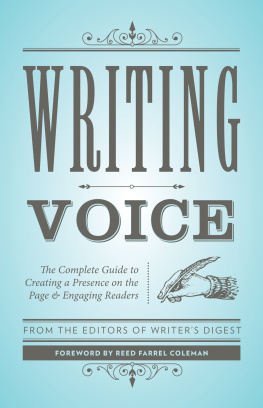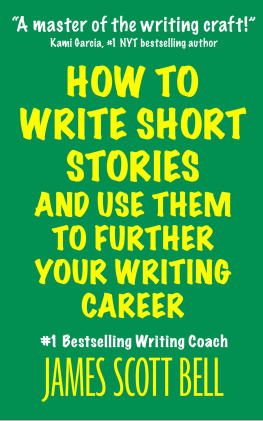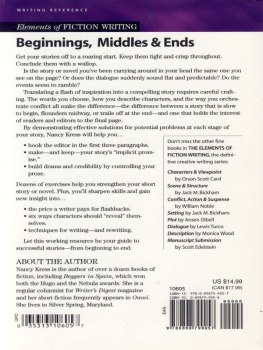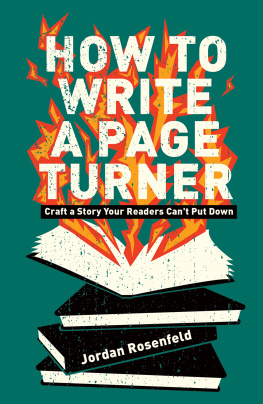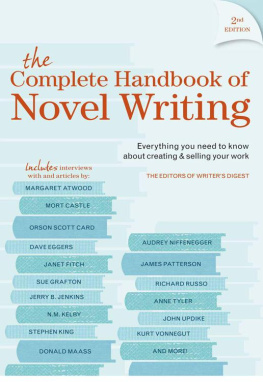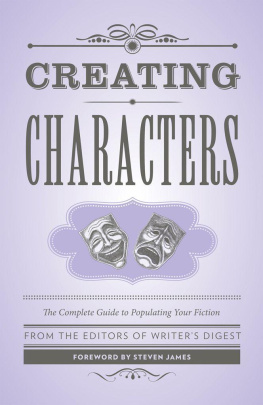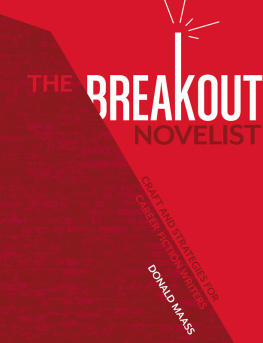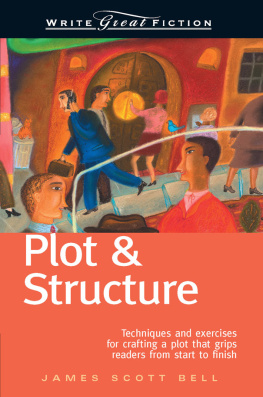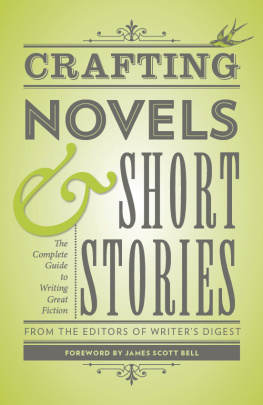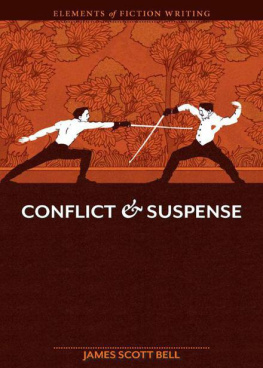Crafting Novels
Short Stories
The Complete Guide to Writing Great Fiction
From the editors of Writers Digest
Foreword by James Scott Bell
Cincinnati, Ohio
www.writersdigest.com
Contents
Focus on the Writing Life:
GETTING STARTED
by the Editors of Writers Digest
by Karen S. Wiesner
The Stakeholders in Your Story
by Nancy Kress
by David Corbett
by Elizabeth Sims
by Leigh Michaels
by Michael J. Vaughn
by Hallie Ephron
by Charles Atkins
Focus on the Writing Life:
FEEDING YOUR CREATIVITY
by Michael J. Vaughn
Your Storys Action & Suspense
by Steven James
by N.M. Kelby
by James Scott Bell
by Heather Sellers
by Les Edgerton
by Elizabeth Sims
by James Scott Bell
by Laura Whitcomb
Focus on the Writing Life:
BEATING WRITERS BLOCK
by Elizabeth Sims
The Voice of Your Story
by James V. Smith, Jr.
by Alicia Rasley
by Kristen Johnson Ingram
by Simon Wood
Focus on the Writing Life:
USING YOUR MUSE
by N.M. Kelby
by Heather Sellers
The Context for Your Story
by Donald Maass
by Brian Kiteley
by Larry Brooks
by Hallie Ephron
by Rachel Ballon
by Leigh Michaels
Focus on the Writing Life:
BALANCING WRITING WITH THE REST OF LIFE
by Sheila Bender
by Christina Katz
What Your Characters Say to Each Other
by Todd A. Stone
by Gloria Kempton
by Michael Levin
Focus on the Writing Life:
MAXIMIZING YOUR PRODUCTIVITY
by Sage Cohen
What You Tell Readers
by Ron Rozelle
by Nancy Lamb
by Nancy Kress
by Adair Lara
by Leigh Anne Jasheway
Focus on the Writing Life:
RESEARCHING YOUR WORK
by the Editors of Writers Digest
How Your Story Comes Together
by Elizabeth Sims
by Donald Maass
by John Dufresne
by Jessica Page Morrell
by Steve Almond
by Lin Enger
Focus on the Writing Life:
GETTING PUBLISHED
by the Editors of Writers Digest
Foreword
BY JAMES SCOTT BELL
When I was a freshly scrubbed law school graduate I went to work for a big civil litigation firm in Beverly Hills. I wanted to be a trial lawyer and, having won my law schools coveted trial advocacy award, I was raring to go. Thought I knew it all right out of the gate.
So the day came when one of the senior associates had a dinky little trial coming up and didnt want to be bothered. He asked me if I wanted to take it. Take it? This was my big moment!
It was indeed a relatively small bench trial (one judge, no jury) but I treated it like the Trial of the Century. When I showed up at the courthouse the other attorney met me, shook my hand, and suggested in collegial tones that perhaps we could settle this thing here and now. He asked to see the new evidence I was going to present, which consisted of a few letters, and I showed him. He conferred with his client and came back and made a settlement offer that was way too low. The lawyer actually said he was now going to take this to trial. He obviously didnt know I was the second coming of Clarence Darrow.
When the trial got under way there was a moment when the opposing lawyer stood up and addressed the judge. He told the judge I was withholding evidence from the court. I have seen this evidence and Mr. Bell is trying to deceive you, Your Honor, he said.
I was furious. I babbled incoherently. It threw me off my game. And even though I won this one-day trial, the amount gained for my client was less than what I thought it should be.
I complained angrily to the senior associate about how I was treated. He snorted and sat me down. Dont you know the first rule of trial work? Dont ever trust the other lawyer.
So simple. So pithy. It was advice I needed to hear before I walked into a courtroom.
There is nothing so instructive in any endeavor of life as having an experienced hand give you the benefit of his wisdom. Which is why I appreciate the writing instruction presented in a good craft book like this one. Its like having that seasoned professional sit down with you and tell you things you could only learn on your own after lots of trial and error, if you learn them at all.
When I was first trying to figure out how to write, I devoured the fiction column in Writers Digest, then inked by the great Lawrence Block. I read it every month as if it were a sacred page, underlining what jumped out at me. I still have binders full of those back issues and have turned to them nostalgically on occasion, always picking up a fresh tip or being reminded of one that Id first read there.
Likewise, I have an entire floor to ceiling bookcase with nothing but writing books, all of them highlighted to one degree or another.
My philosophy has always been if I can learn just one thing from an article or book on writing, its worth it. If there is one tip or technique that will lift my writing to another level, I want to know it. I dont ever want to rest as a writer. Books like the one you are holding your hand are your friends in that regard.
The fact that it is a collection from a number of brilliant teachers of the craft is a huge benefit. Its like you get to sit at a large table for coffee with a group of skilled instructors and listen to their insights while you take notes. In fact, its better. You dont have to pause and ask them to repeat something. You can linger over a section of the book as long as you want.
But you must do more than that. You must put into practice what you learn. When you read something that strikes you as relevant to your own writing journey, figure out a way to practice it. Make up a writing exercise for yourself.
Youll find many exercises already in the book, waiting for you. Dont know what to write? Try .
Are your characters not coming to life as youd like? .
If time to write is a problem, drink in .
In fact, drink in this whole book. Linger over it. Keep it handy. Youll find yourself turning to it when you need to, and even before you need to. What you have here is instructional gold. Mine it, refine it, use it. And follow three simple rules:
- Keep learning.
- Keep writing.
- Never trust the other lawyer.
James Scott Bell
Introduction
Writing fiction requires grit and sensitivity. Its an elusive craft. You chase it and chase it, and you sometimes feel like youll never master it. The subtleties of character, word choice, and revision make it imperative to stay in tune with every element of your work, even as you relentlessly battle the writers self-conscious subconscious.
Its daunting to say the least.
By picking up this book, youve taken a decisive step to prove your dedication to the craft. In these pages youll find the know-how your need to fuel your determination. Thats what this book is for. It pulls together the expert writers, editors, and agents to give the best advice for every aspect of fiction writing. With their wisdom, youll find your confident, compelling voice.


